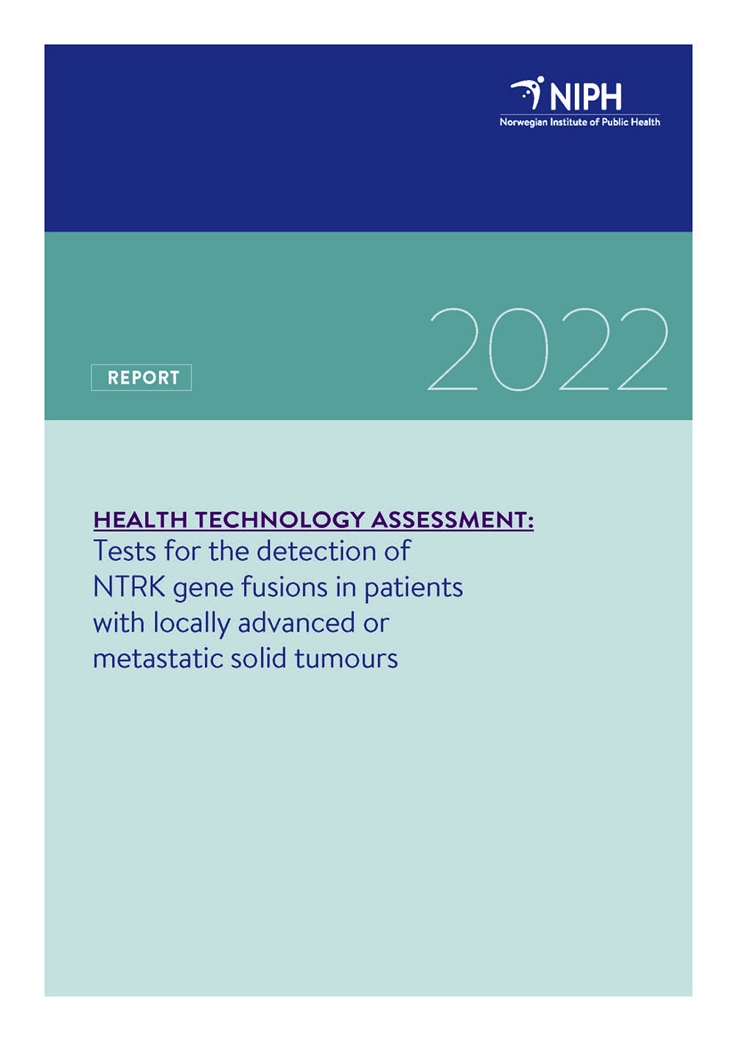Tests for the detection of NTRK gene fusions in patients with locally advanced or metastatic solid tumours. A Health Technology Assessment.
Health technology assessment
|Published
The Norwegian Institute of Public Health has been commissioned to assess molecular tests for the identification of NTRK gene fusions in locally advanced or metastatic solid tumours.
Key message
The Norwegian Institute of Public Health has been commissioned to assess molecular tests for the identification of NTRK gene fusions in locally advanced or metastatic solid tumours. Less than 1% of solid tumours have somatic NTRK gene fusions, with higher prevalence in younger children than in adults. Accurate and reliable detection of NTRK fusions is important for identification of people who may benefit from drug treatment (e.g., entrectinib and larotrectinib), as well as NTRK fusion negative patients, to avoid provision of unnecessary and costly medications.
We included nine studies comparing one or more analytical techniques (IHC, FISH, RT-PCR, NGS) for the detection of NTRK gene fusions that reported test accuracy data. Five narrative reviews, and two expert opinion papers provided feasibility data. Experts were contacted for cost information. The results of this HTA show that:
- Test accuracy was mostly inadequate, and reporting was poor.
- Un-pooled results including six test comparison suggest varying test accuracy mostly for single gene testing (e.g., IHC), across different types of solid tumours and NTRK fusions.
- The results suggest higher sensitivity of RNA-NGS than DNA-NGS in detecting NTRK gene fusions, especially for fusions with large intronic regions (NTRK2, and NTRK3).
- While there are advantages and limitations for all the tests, single gene testing may be unfeasible, especially when the number of actionable biomarkers relevant for testing are increasing.
- Due to a tendency for false positive staining NTRK fusions positive with IHC needs confirmation with other molecular methods (e.g., RT-PCR or RNA-NGS).
- The development of a testing algorithm for the detection of NTRK fusions depends on accessibility of testing modalities, economic considerations, histology and turnaround time.
- The cost associated with NGS testing will significantly decrease when parallel tests are performed for several biomarkers (using gene panels) from multiple patients. At present, the capital and infrastructure as well as maintenance costs are higher for NGS than the other diagnostic methods.
- NTRK fusions can be detected in many different types of advanced solid tumours, we estimated that between 10,000-11,100 people may be eligible for NTRK testing in Norway each year. The cost for testing common solid tumours with a low frequency of NTRK fusions using IHC as pre-test with NGS confirmation were estimated to be 16.1-18.0 million Norwegian kroner (NOK). The costs for testing rare tumours with a high frequency of NTRK fusions with NGS were estimated to be about NOK 1.2 million.
Future research should focus on conducting larger cohort studies with well-defined patient populations, that follows the patients from testing (or no testing), through treatment and final outcomes. Further, robust and replicable methods, as well as a reporting standard checklist, should be used for increased clarity


